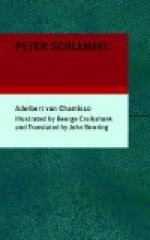The ranger, with a written paper in his hand, was walking up and down in an agitated manner, and struggling to suppress his feelings--his usually unmoved countenance being one moment flushed, and the next perfectly pale. He came forward as I entered, and, in a faltering voice, requested a private conversation with me. The path by which he requested me to follow him led to an open spot in the garden, where the sun was shining. I sat down. A long silence ensued, which even the good woman herself did not venture to break. The ranger, in an agitated manner, paced up and down with unequal steps. At last he stood still; and glancing over the paper he held in his hand, he said, addressing me with a penetrating look,
“Count Peter, do you know one Peter Schlemihl?” I was silent.
“A man,” he continued, “of excellent character and extraordinary endowments.”
He paused for an answer.—“And supposing I myself were that very man?”
“You!” he exclaimed, passionately; “he has lost his shadow!”
“Oh, my suspicion is true!” cried Minna; “I have long known it—he has no shadow!” And she threw herself into her mother’s arms, who, convulsively clasping her to her bosom, reproached her for having so long, to her hurt, kept such a secret. But, like the fabled Arethusa, her tears, as from a fountain, flowed more abundantly, and her sobs increased at my approach.
“And so,” said the ranger fiercely, “you have not scrupled, with unparalleled shamelessness, to deceive both her and me; and you pretended to love her, forsooth—her whom you have reduced to the state in which you now see her. See how she weeps!—Oh, shocking, shocking!”
By this time I had lost all presence of mind; and I answered, confusedly, “After all, it is but a shadow, a mere shadow, which a man can do very well without; and really it is not worth the while to make all this noise about such a trifle.” Feeling the groundlessness of what I was saying, I ceased, and no one condescended to reply. At last I added, “What is lost to-day may be found to-morrow.”
“Be pleased, sir,” continued the ranger, in great wrath—“be pleased to explain how you have lost your shadow.”
Here again an excuse was ready: “A boor of a fellow,” said I, “one day trod so rudely on my shadow that he tore a large hole in it. I sent it to be repaired—for gold can do wonders—and yesterday I expected it home again.”
“Very well,” answered the ranger. “You are a suitor for my daughter’s hand, and so are others. As a father, I am bound to provide for her. I will give you three days to seek your shadow. Return to me in the course of that time with a well-fitted shadow, and you shall receive a hearty welcome; otherwise, on the fourth day—remember, on the fourth day—my daughter becomes the wife of another.”
I now attempted to say one word to Minna; but, sobbing more violently, she clung still closer to her mother, who made a sign for me to withdraw. I obeyed; and now the world seemed shut out from me for ever.




